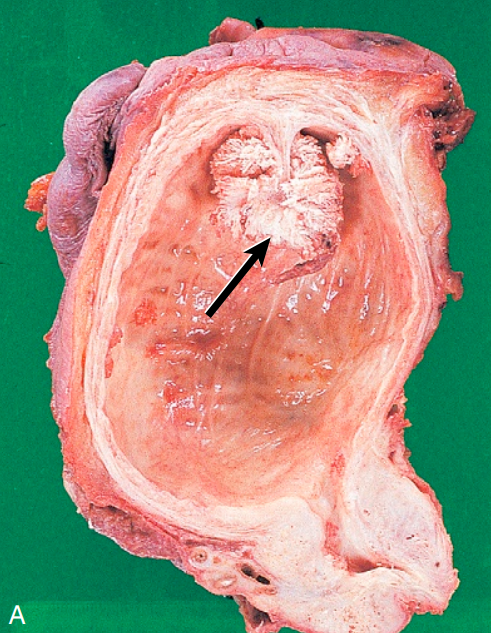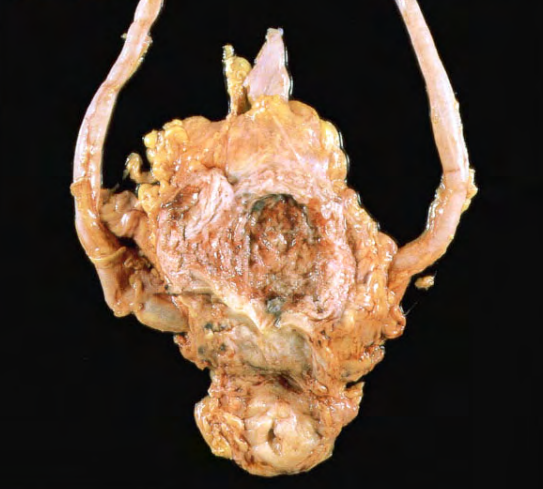Bladder Cancer
Content of This Page
1- Introduction
2- Causes
3- Symptoms
4- Stages of The Bladder Cancer
5- Treatment
6- What Should You Avoid
Introduction
Bladder cancer is a type of cancer that begins in the cells of the bladder, the organ responsible for storing urine. It most commonly starts in the urothelial cells that line the inside of the bladder, though it can develop in other areas of the bladder as well.

Causes
Bladder cancer can be caused by a variety of factors, many of which involve exposure to harmful substances or long-term irritation of the bladder. The exact cause of bladder cancer is not always clear, but several risk factors and potential causes have been identified:
1. Smoking
- Primary Cause: Smoking is the leading cause of bladder cancer. Tobacco smoke contains carcinogens that are filtered by the kidneys and concentrated in the urine, where they can damage the lining of the bladder over time.
2. Chemical Exposure
- Industrial Chemicals: Long-term exposure to certain chemicals used in the dye, rubber, leather, textile, and paint industries can increase the risk. Chemicals like aromatic amines (used in the dye industry) are particularly harmful.
- Arsenic: Drinking water containing high levels of arsenic is linked to an increased risk of bladder cancer.
3. Chronic Bladder Inflammation
- Chronic Infections: Recurrent urinary tract infections (UTIs), bladder stones, or long-term use of urinary catheters can cause chronic inflammation, which may increase the risk of squamous cell carcinoma in the bladder.
- Schistosomiasis: A parasitic infection that can cause chronic inflammation of the bladder and is associated with a higher risk of bladder cancer, particularly in parts of Africa and the Middle East.
4. Previous Cancer Treatments
- Radiation Therapy: Radiation to the pelvis, such as for cervical or prostate cancer, increases the risk of bladder cancer.
- Chemotherapy: Certain chemotherapy drugs, like cyclophosphamide, can raise the risk due to their toxic effects on the bladder.
5. Genetic and Family History
- Genetic Mutations: Certain inherited genetic mutations can increase susceptibility to bladder cancer.
- Family History: A family history of bladder cancer can increase your risk, though most cases are not directly inherited.
6. Age and Gender
- Age: Bladder cancer is more common in older adults, with most cases occurring in people over 55.
- Gender: Men are more likely to develop bladder cancer than women, possibly due to higher rates of smoking and occupational exposure to harmful chemicals.
7. Race and Ethnicity
- Caucasians: Bladder cancer is more common in Caucasians than in people of other races, though the reasons for this are not well understood.
8. Diet and Fluid Intake
- Low Fluid Intake: Not drinking enough fluids can lead to less frequent urination, which might allow harmful chemicals to stay in contact with the bladder lining for longer periods.
- Diet: Diets high in processed meats or low in fruits and vegetables may be associated with a higher risk, though the evidence is not as strong as for other risk factors.
9. Personal History of Bladder Cancer
- Recurrence: People who have had bladder cancer before are at risk of developing new tumors in the bladder or elsewhere in the urinary tract.
10. Medications
- Pioglitazone: A diabetes medication that has been linked to an increased risk of bladder cancer when used for more than a year.
Symptoms
Blood in urine (hematuria): The most common symptom, which may cause the urine to appear bright red or cola-colored. Sometimes, the blood is present in amounts that are not visible to the naked eye (microscopic hematuria) but can be detected with a urine test.
Frequent urination.
Painful urination (dysuria).
Pelvic pain.
Back pain.

Stages of The Bladder Cancer
- Stage 0: Cancer is only in the bladder’s inner lining.
- Stage I: Cancer has spread to the connective tissue layer but not to the muscle layer.
- Stage II: Cancer has spread to the muscle layer of the bladder.
- Stage III: Cancer has spread beyond the bladder to surrounding tissues.
- Stage IV: Cancer has spread to nearby organs, lymph nodes, or distant parts of the body.
Treatment
Surgery:
- Transurethral resection of bladder tumor (TURBT): Removes tumors from the bladder lining.
- Cystectomy: Partial or complete removal of the bladder.
Intravesical Therapy:
- BCG (Bacillus Calmette-Guérin) therapy: A treatment involving a solution placed directly into the bladder.
- Intravesical chemotherapy: Chemotherapy drugs are placed directly into the bladder.
Chemotherapy: Systemic treatment to kill cancer cells throughout the body.
Radiation Therapy: Using high-energy rays to target and kill cancer cells.
Immunotherapy: Drugs that help the immune system fight cancer cells.
Targeted Therapy: Drugs that target specific weaknesses in cancer cells.
What Should You Avoid
1. Smoking
- Why: Major risk factor; tobacco contains carcinogens that damage the bladder.
- Action: Quit smoking using cessation programs or aids.
2. Harmful Chemicals
- Why: Exposure to industrial chemicals (e.g., in dye, rubber industries) increases risk.
- Action: Follow safety protocols and use protective gear at work.
3. Chronic Bladder Irritation
- Why: Recurrent UTIs, bladder stones, and long-term catheter use can increase risk.
- Action: Treat infections promptly and manage conditions causing irritation.
4. Arsenic in Water
- Why: High levels of arsenic in drinking water are linked to bladder cancer.
- Action: Test water for arsenic and use filtration if needed.
5. Certain Medications
- Why: Some drugs like pioglitazone may increase bladder cancer risk.
- Action: Discuss alternatives with your doctor.
6. Low Fluid Intake
- Why: Infrequent urination allows harmful substances to linger in the bladder.
- Action: Stay hydrated by drinking plenty of water.
7. Processed Foods
- Why: Diets high in processed meats and low in fruits/vegetables may increase risk.
- Action: Eat a balanced diet rich in fruits and vegetables.
8. Occupational Hazards
- Why: Certain jobs expose you to bladder cancer-causing chemicals.
- Action: Use protective gear and follow safety guidelines.
9. Ignoring Symptoms
- Why: Early symptoms like blood in urine need prompt attention.
- Action: See a doctor if you notice symptoms.
10. Radiation and Chemotherapy Exposure
- Why: Past treatments may increase bladder cancer risk.
- Action: Discuss regular screenings with your doctor if applicable.